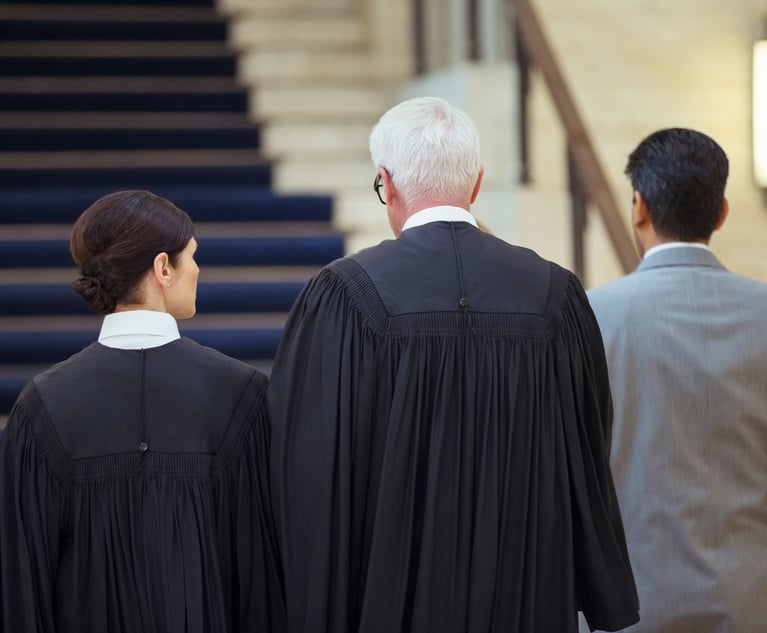Judicial Ethics Opinion 19-153
If a town justice believes the town board's hiring procedure in hiring a court clerk was unlawful and/or creates an appearance of impropriety, he/she must withhold his/her consent to hiring the selected court clerk.
July 15, 2020 at 09:55 AM
5 minute read
The Advisory Committee on Judicial Ethics responds to written inquiries from New York state's approximately 3,600 judges and justices, as well as hundreds of judicial hearing officers, support magistrates, court attorney-referees, and judicial candidates (both judges and non-judges seeking election to judicial office). The committee interprets the Rules Governing Judicial Conduct (22 NYCRR Part 100) and, to the extent applicable, the Code of Judicial Conduct. The committee consists of 27 current and retired judges, and is co-chaired by former associate justice George D. Marlow of the Appellate Division and the Honorable Margaret Walsh, a justice of the Supreme Court.
Digest: (1) If a town justice believes the town board's hiring procedure in hiring a court clerk was unlawful and/or creates an appearance of impropriety, he/she must withhold his/her consent to hiring the selected court clerk. (2) A town justice need not object to employing a court clerk who: (a) is the town supervisor's second-degree relative, but must insulate him/her from all cases in which the town supervisor is personally involved or in which the town is a named party; (b) will continue to work for a criminal defense attorney for one month while being trained by the outgoing court clerk, but must insulate him/her from matters involving that attorney during this period; and/or (c) during the interview, expressed interest in assisting the town clerk if hired as town court clerk.
Rules: Town Law § 20(1)(a); 22 NYCRR 100.2; 100.2(A); 100.3(B)(1); Opinions 19-128; 18-12; 17-65; 16-23; 15-216; 14-114; 13-03; 09-205.
Opinion: A town justice is concerned about the town board's choice of a new court clerk. First, the town board eliminated some applicants in executive session without permitting the judge to review the applications and insisted on conducting the interview at a time when the judge would only be able to participate by telephone. The judge believes this procedure deprived him/her of a chance for meaningful input, even though Town Law § 20(1)(a) states "[t]he clerk of the court of a town shall be employed and discharged from employment only upon the advice and consent of the town justice or justices." Second, the judge is uncomfortable with the selected applicant, who is the town supervisor's second-degree relative and currently works for a local lawyer. If hired, the incoming court clerk would hold both positions for approximately one month, while being trained by the outgoing court clerk, but would end the outside employment on the outgoing court clerk's last day. Finally, judge is also concerned that, during his/her interview, the applicant expressed interest in "assisting the Town clerk" if hired as a town court clerk.
A judge must always avoid even the appearance of impropriety (see 22 NYCRR 100.2) and must always act to promote public confidence in the judiciary's integrity and impartiality (see 22 NYCRR 100.2[A]). A judge also must "respect and comply with the law" (22 NYCRR 100.2[A]) and "be faithful to [it]" (22 NYCRR 100.3[B][1]).
1. What are a town justice's ethical obligations when he/she believes he/she "was not afforded a fair opportunity to advise and consent to the hiring of this court clerk position as provided by section 20 of the Town Law"?
We cannot comment on the propriety of the town board's procedures. However, if the judge believes the procedure was unlawful and/or creates an appearance of impropriety, he/she must withhold his/her consent to hiring of the selected court clerk (see 22 NYCRR 100.2[A] [judge must "respect and comply with the law"]; 100.3[B][1] [judge must "be faithful to the law"]). In addition, whether or not the judge believes the conduct was unlawful, the judge may also, in his/her sole discretion, take any other lawful steps to express his/her objections, including (but not limited to) raising his/her concerns with court administrators or town officials (see e.g. Opinions 09-205; 14-114).
2. May a town justice consent to the hiring of a court clerk who (a) is the town supervisor's second-degree relative, (b) will continue to work for a criminal defense attorney for one month while being trained by the outgoing court clerk, and (c) during the interview process, "indicated [an] interest in assisting the Town clerk" if hired as town court clerk?
The judge need not object to hiring a court clerk based solely on these factors (see Opinions 19-128 [a village justice may consent to the appointment of a court clerk whose spouse is a village trustee]; 15-216 [town or village justice may permit a part-time court clerk to accept part-time clerical employment with a law firm which will no longer appear in the judge's court after hiring the court clerk]; 13-03 [town justice may permit the town court clerk to serve simultaneously as the town clerk]). Accordingly, the judge may ethically consent to the appointment, provided he/she is satisfied with the selection (cf. Opinion 16-23 [judge need not appoint an expert whose competence he/she questions]).
However, if the newly hired court clerk's private employer appears in the judge's court during the one-month "overlap" in employment, the judge must insulate him/her from the matter and disclose the insulation (see Opinion 15-216). Moreover, in light of the clerk's familial relationship with the town supervisor, the judge must also insulate the court clerk from all cases in which the town supervisor is personally involved (e.g. as a party or a witness) or in which the town is a named party (see Opinion 18-12). [1]
[1] We assume these insulation requirements will not unduly hinder court operations. If this assumption is incorrect, we suggest the judge seek further guidance before consenting to the proposed employment (see Opinion 17-65 [where ethically mandated insulation would prevent the court clerk from performing his/her duties if hired, the judge may not consent to the proposed employment]).
This content has been archived. It is available through our partners, LexisNexis® and Bloomberg Law.
To view this content, please continue to their sites.
Not a Lexis Subscriber?
Subscribe Now
Not a Bloomberg Law Subscriber?
Subscribe Now
NOT FOR REPRINT
© 2024 ALM Global, LLC, All Rights Reserved. Request academic re-use from www.copyright.com. All other uses, submit a request to [email protected]. For more information visit Asset & Logo Licensing.
You Might Like
View AllTrending Stories
- 1Call for Nominations: Elite Trial Lawyers 2025
- 2Senate Judiciary Dems Release Report on Supreme Court Ethics
- 3Senate Confirms Last 2 of Biden's California Judicial Nominees
- 4Morrison & Foerster Doles Out Year-End and Special Bonuses, Raises Base Compensation for Associates
- 5Tom Girardi to Surrender to Federal Authorities on Jan. 7
Who Got The Work
Michael G. Bongiorno, Andrew Scott Dulberg and Elizabeth E. Driscoll from Wilmer Cutler Pickering Hale and Dorr have stepped in to represent Symbotic Inc., an A.I.-enabled technology platform that focuses on increasing supply chain efficiency, and other defendants in a pending shareholder derivative lawsuit. The case, filed Oct. 2 in Massachusetts District Court by the Brown Law Firm on behalf of Stephen Austen, accuses certain officers and directors of misleading investors in regard to Symbotic's potential for margin growth by failing to disclose that the company was not equipped to timely deploy its systems or manage expenses through project delays. The case, assigned to U.S. District Judge Nathaniel M. Gorton, is 1:24-cv-12522, Austen v. Cohen et al.
Who Got The Work
Edmund Polubinski and Marie Killmond of Davis Polk & Wardwell have entered appearances for data platform software development company MongoDB and other defendants in a pending shareholder derivative lawsuit. The action, filed Oct. 7 in New York Southern District Court by the Brown Law Firm, accuses the company's directors and/or officers of falsely expressing confidence in the company’s restructuring of its sales incentive plan and downplaying the severity of decreases in its upfront commitments. The case is 1:24-cv-07594, Roy v. Ittycheria et al.
Who Got The Work
Amy O. Bruchs and Kurt F. Ellison of Michael Best & Friedrich have entered appearances for Epic Systems Corp. in a pending employment discrimination lawsuit. The suit was filed Sept. 7 in Wisconsin Western District Court by Levine Eisberner LLC and Siri & Glimstad on behalf of a project manager who claims that he was wrongfully terminated after applying for a religious exemption to the defendant's COVID-19 vaccine mandate. The case, assigned to U.S. Magistrate Judge Anita Marie Boor, is 3:24-cv-00630, Secker, Nathan v. Epic Systems Corporation.
Who Got The Work
David X. Sullivan, Thomas J. Finn and Gregory A. Hall from McCarter & English have entered appearances for Sunrun Installation Services in a pending civil rights lawsuit. The complaint was filed Sept. 4 in Connecticut District Court by attorney Robert M. Berke on behalf of former employee George Edward Steins, who was arrested and charged with employing an unregistered home improvement salesperson. The complaint alleges that had Sunrun informed the Connecticut Department of Consumer Protection that the plaintiff's employment had ended in 2017 and that he no longer held Sunrun's home improvement contractor license, he would not have been hit with charges, which were dismissed in May 2024. The case, assigned to U.S. District Judge Jeffrey A. Meyer, is 3:24-cv-01423, Steins v. Sunrun, Inc. et al.
Who Got The Work
Greenberg Traurig shareholder Joshua L. Raskin has entered an appearance for boohoo.com UK Ltd. in a pending patent infringement lawsuit. The suit, filed Sept. 3 in Texas Eastern District Court by Rozier Hardt McDonough on behalf of Alto Dynamics, asserts five patents related to an online shopping platform. The case, assigned to U.S. District Judge Rodney Gilstrap, is 2:24-cv-00719, Alto Dynamics, LLC v. boohoo.com UK Limited.
Featured Firms
Law Offices of Gary Martin Hays & Associates, P.C.
(470) 294-1674
Law Offices of Mark E. Salomone
(857) 444-6468
Smith & Hassler
(713) 739-1250










